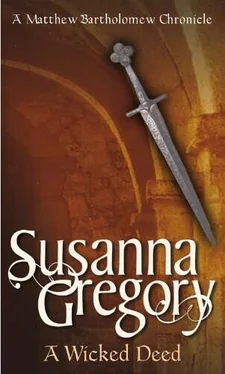Susanna Gregory - A Wicked Deed
Здесь есть возможность читать онлайн «Susanna Gregory - A Wicked Deed» весь текст электронной книги совершенно бесплатно (целиком полную версию без сокращений). В некоторых случаях можно слушать аудио, скачать через торрент в формате fb2 и присутствует краткое содержание. Год выпуска: 2010, ISBN: 2010, Издательство: Little, Brown Book Group, Жанр: Исторический детектив, на английском языке. Описание произведения, (предисловие) а так же отзывы посетителей доступны на портале библиотеки ЛибКат.
- Название:A Wicked Deed
- Автор:
- Издательство:Little, Brown Book Group
- Жанр:
- Год:2010
- ISBN:9780748124411
- Рейтинг книги:3 / 5. Голосов: 1
-
Избранное:Добавить в избранное
- Отзывы:
-
Ваша оценка:
- 60
- 1
- 2
- 3
- 4
- 5
A Wicked Deed: краткое содержание, описание и аннотация
Предлагаем к чтению аннотацию, описание, краткое содержание или предисловие (зависит от того, что написал сам автор книги «A Wicked Deed»). Если вы не нашли необходимую информацию о книге — напишите в комментариях, мы постараемся отыскать её.
A Wicked Deed — читать онлайн бесплатно полную книгу (весь текст) целиком
Ниже представлен текст книги, разбитый по страницам. Система сохранения места последней прочитанной страницы, позволяет с удобством читать онлайн бесплатно книгу «A Wicked Deed», без необходимости каждый раз заново искать на чём Вы остановились. Поставьте закладку, и сможете в любой момент перейти на страницу, на которой закончили чтение.
Интервал:
Закладка:
‘And is one of these fine students Unwin?’ asked Tuddenham, flattered, and treating Michael to a display of his long teeth. ‘The man who will become our new priest when the old one retires?’
‘Yes,’ said Michael. ‘Unwin is keen to make your acquaintance as quickly as possible.’
‘Excellent,’ beamed Tuddenham, rubbing his hands together again. ‘This is all working out most agreeably.’
It was pleasant sitting in the sun and watching the revelry on the green. At noon, the sun became so warm that Bartholomew, drowsy from the ale, fell asleep, and did not wake until well into the afternoon. He looked around for his colleagues, and was disturbed to hear that Alcote and the students had still not arrived. He considered going to look for them, but Cynric did not seem to share his concern, suggesting that Alcote must have stopped for a meal at an inn along the way, and that they should give him a little longer.
While he had been asleep, a colourful awning had been erected over the Tuddenhams’ table, and Michael sat under it, regaling the knight and his family with stories of life in Cambridge, while devouring a plate of cakes that had been set in front of him. Seeing him awake, Isilia came to fill Bartholomew’s cup with yet more ale. To avoid being caught staring at her again, he studiously watched some jugglers on the green, only looking at her when she left, to admire the way her green dress clung to her slender hips.
When she had returned to her seat, Tuddenham took Michael’s arm, and led him to where Bartholomew leaned comfortably against the sun-warmed stones of the churchyard wall. William joined them, not wanting to be left out of any interesting discussions. Tuddenham glanced furtively at his wife and mother, both now conveniently out of earshot, and then turned his attention to the scholars.
‘Now you have taken some ale and slept a while, can you make a start on the advowson?’
‘Tomorrow would be better,’ said Michael, regarding the notion of immediate labour without enthusiasm. ‘We will be rested, and less likely to make mistakes that will later need to be rectified.’
Bartholomew agreed. Keen though he was to return to Cambridge, advowsons were invariably complicated documents, and mistakes made early in the proceedings usually resulted in delays later.
‘He wants to get rid of us as quickly as possible,’ said William to Bartholomew, in a whisper that Tuddenham would have to have been deaf not to hear. ‘I said seven scholars was too many.’
‘Then perhaps a little wine might help,’ said Tuddenham to Michael, beckoning to his wife to bring some. ‘Ale is no drink to stimulate the brain.’
When Isilia presented her guests with the wine, the goblets proved to be enormous, and Bartholomew did not know how he would finish his, as well as the ale, without becoming drunk. He need not have worried: Michael downed most of his own in a single gulp, and then furtively switched vessels with the physician in the hope that he would not notice.
Isilia sat next to Bartholomew and refilled the cup in front of him, while Father William — no more in the mood for writing legal texts that evening than Michael and Bartholomew — invented a host of spurious reasons why work on the advowson would be better undertaken the following day.
Isilia frowned thoughtfully before addressing Bartholomew. ‘Grundisburgh Church is a very rich living. Why did Michaelhouse appoint a student to be a priest, rather than a Fellow like you?’
She smiled at him, green eyes dark against her white skin, and Bartholomew’s hand shook, spilling wine on his tabard.
‘Unwin is a deeply religious, compassionate man and a fine scholar,’ he said, choosing his words carefully. Although Michaelhouse was delighted to possess the living, none of the Fellows much relished the notion of being banished to deepest Suffolk to act as parish priest. That was something to be foisted on students, who were not in a position to argue about it.
She regarded him quizzically. ‘I would expect most friars to be deeply religious, compassionate men.’
Bartholomew wondered how she had arrived at such a conclusion. It was certainly not one that applied universally to friars from somewhere like Cambridge, where membership of a strong Order like the Franciscans or the Dominicans was often seen as the best path to earthly, rather than heavenly, power.
Isilia continued. ‘But you make Unwin sound dull. A “deeply religious, compassionate man and a fine scholar”. Is there nothing more interesting to say of him?’
Bartholomew suspected there was not, and personally considered the Franciscan something of a nonentity — unlike his friend John de Horsey. Horsey was tall and striking, with amber eyes and smooth nut-coloured hair. He was also quick-witted, amusing and popular, and would have made a far better priest for Grundisburgh than the timid Unwin.
‘So, you are a physician?’ she asked conversationally, when Bartholomew did not reply. ‘That must be an unpleasant occupation.’
‘At times,’ Bartholomew admitted. ‘But it can also be very rewarding. For example, physicians are not usually called to childbirths, but a number of women have asked me to attend them since the plague took so many of the skilled midwives. Delivering a healthy baby is very satisfying.’
‘Oh,’ said Isilia, clearly scraping the recesses of her mind for something intelligent to say. ‘These are merchants’ and landowners’ wives, I imagine? You must meet some interesting people.’
‘Actually, they are usually the town’s poor. The landowners’ and merchants’ wives can afford to pay the high fees of the two surviving midwives.’
‘I see,’ said Isilia, trying hard to mask her distaste. ‘But do these women not object to having a man present at such a time? I would.’
‘Most of them are so desperate, they would not care if I were a dancing bear, as long as I helped them. Unfortunately, the shortage of experienced midwives has led to a number of unscrupulous women pretending to be qualified when they are not. They concoct dreadful potions that they say will hasten labour or deliver a boy-child rather than a girl, and they often make the mother ill.’
‘How dreadful,’ said Isilia. Bartholomew did not see the desperate glance she cast at Dame Eva in the hope that she might be extricated from the disagreeable discussion.
‘I caught one feeding a paste of crushed snails, sparrows’ brains, red arsenic and wormwood to her patient, telling her it would prevent fevers,’ he continued, warming to his theme. ‘It killed the unborn child and gave the mother a terrible bleeding …’
‘I hardly think descriptions of your dealings with pregnant peasants is a suitable topic of conversation for Lady Isilia, Matt,’ said Michael, gallantly coming to her rescue. ‘You should tell her about your expertise with horoscopes instead.’
‘Really?’ said Isilia, suddenly interested as Bartholomew shot the monk a withering look. ‘Then you must cast mine and that of my unborn child. And I will introduce you to Master Stoate, the village physician. He, too, loves astrology.’ She hesitated. ‘Although I am certain he will not want to talk about pastes made of snail brains and crushed sparrow.’
‘I am not very good at horoscopes,’ said Bartholomew firmly, wanting to nip that notion in the bud before he became inundated with requests for astrological consultations. Predicting courses of treatment for continued good health from the movements of the heavenly bodies was a time-consuming and tedious business if it were to be done accurately, and Bartholomew was determined not to waste his time on it.
Isilia seemed as though she would insist, but Michael interrupted with a spiteful chuckle. ‘Here comes Alcote at last. I was beginning to think we had succeeded in losing him completely.’
Читать дальшеИнтервал:
Закладка:
Похожие книги на «A Wicked Deed»
Представляем Вашему вниманию похожие книги на «A Wicked Deed» списком для выбора. Мы отобрали схожую по названию и смыслу литературу в надежде предоставить читателям больше вариантов отыскать новые, интересные, ещё непрочитанные произведения.
Обсуждение, отзывы о книге «A Wicked Deed» и просто собственные мнения читателей. Оставьте ваши комментарии, напишите, что Вы думаете о произведении, его смысле или главных героях. Укажите что конкретно понравилось, а что нет, и почему Вы так считаете.












